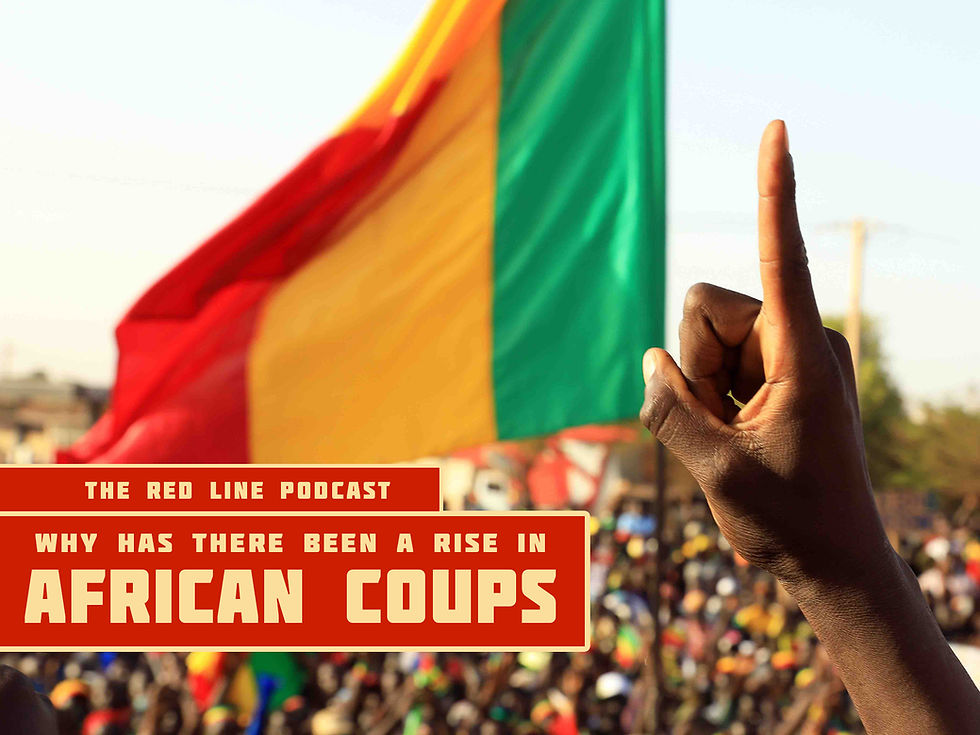Episode 97. The Death of Françafrique: Africa's Rebalancing Act
- The Red Line

- Jun 12, 2023
- 3 min read
Listen to this episode on: Apple Podcasts | Spotify | Libsyn RSS
The ensuing dramatic demise of Françafrique and the consequential transformation of France's strategic goals in Africa have reshaped much of the geopolitics of the region. France no longer has the overt influence it once did but is instead moving to build influence with old partners through the EU and new partners through large investments into the Commonwealth nations. To France's detriment, though, other players like Russia, China, the UK, and the US have begun to move themselves into these power vacuums left by the French exit, and France may soon lose its primary position within West Africa.
Who will end up holding influence over the region's natural resources? Will this impact the private sector as well? And where does the future lie for France's strategic interests? We ask our panel of experts.
Episode Overview:
Part 1: A Franc Discussion (5:49)
Catherine Gegout commences our conversation with some context around France's modern Africa policy, including a reduction in (but ongoing) French military troops stationed on the continent and its history of military intervention, often acting independently but increasing as the lead partner with an international coalition.
We discuss the strategic resources in this region important to France, including oil and uranium, and the economic and structural policies France pursues to protect those interests.
We compare the French military policy in Africa to other nations with bases on the continent, as well as the trend towards coordination and cooperation with others such as the US and UK.
We unpack the trend of French military withdrawal in some nations, with Russia's Wagner Group entering to fill the vacuum as international security guarantor. We also discuss other European nations attempting to support security and anti-terror interventions in Africa.
Part 2: Extortion and Energy (25:39)
Colby Connelly discusses the role of Africa in supplying oil and gas to France and Europe, including Algeria, and the role of French energy giant Total.
We explore how foreign mining and resources companies might approach investing and commencing a project in these nations and if there is an alternative to a third-party security force such as Wagner.
We also discuss the potential for non-French investors filling the gaps where France withdraws from Francophone nations, and the tension inherent with the long lead times required to recoup investment in energy projects.
Part 3: The Empire Strikes Back (44:02)
Alex Vines commences our final chapter by noting France's "turning away" from former colonies in favour of primarily Anglophone African nations.
We discuss the underlying strategic motivations for France's military operations in Africa, including in Mali and Niger over the last decade.
We note that two former French colonies, Gabon and Togo, joined the Commonwealth in recent years, underlines the diversification of relations in the region.
We evaluate the success and impact of Wagner in the region, in comparison to France, and what the future of security provision looks like for these nations.
Episode Guests:
Catherine Gegout
Associate Professor in International Relations at the University of Nottingham
Author of Why Europe Intervenes in Africa: Security Prestige and the Legacy of Colonialism
Her research currently focuses upon European intervention in Africa and the impact of EU economic policies in the developing world
Colby Connelly
Senior Research Analyst at Energy Intelligence
His work primarily focuses on regional macroeconomics, operating conditions and political trends in the Middle East and North Africa, including oil markets, OPEC-plus, geopolitics and the regional effects of the energy transition
Former Research Associate at the Arab Gulf States Institute in Washington
Alex Vines
Director of the Africa Programme at Chatham House since 2002, as well as Managing Director for Risk, Ethics and Resilience in 2019
He chaired the UN Panel of Experts on Côte d’Ivoire from 2005 to 2007, and was a member of the UN Panel of Experts on Liberia from 2001 to 2003
Previously he worked at Human Rights Watch as a Senior Researcher on its Africa, Arms and Business and Human Rights programmes, and has served as a consultant including for the UN Office on Drugs and Crime (UNODC); JICA, DFID, USAID, the EU and for the Economic Community of West African States (ECOWAS)
The Red Line's Françafrique Reading List:
We’ve compiled a list of further reading to better understand the geopolitics of Francophone Africa.
Books:
The Looting Machine Tom Burgis
Africa's Last Colonial Currency
Fanny Pigeaud and Ndongo Samba Sylla
Africa Is Not A Country
Dipo Faloyin
For episode transcripts, monthly geopolitics Q&A’s, member-only videos and to support the show, check out our Patreon here: https://www.patreon.com/theredlinepodcast
This episode is dedicated to our Patreon member Thomas Garrison, Michael Wichman, Christopher Mastroianni, Vadim Kovalskiy, Devin Riley, Kennan Farmer, Robert Stewert, Thomas Mullane, and Annie K.
.jpg)






